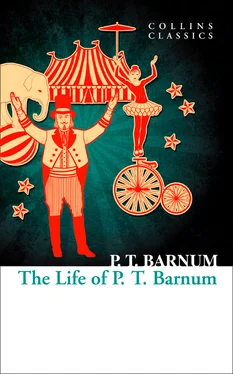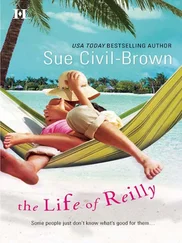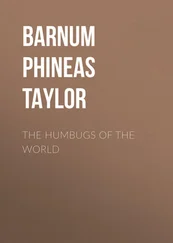On Saturday nights I usually went to Bethel to remain with my mother and attend church on the Sabbath. My mother continued for some years to keep the village tavern. One Saturday evening a violent thunder shower came up; it was very dark, and rained in torrents, with occasional intervals of a few minutes. Miss Mary Wheeler (who was a milliner) sent word across to the store that there was a girl at her house from Bethel, who had come up on horseback to obtain her new bonnet, that she was afraid to return home alone, and if I was going to Bethel on horseback that night, she wished me to escort her customer. I assented, and in a few minutes my horse was at “Aunt Rushia’s” door. I went in, and was introduced to a fair, rosy-cheeked, buxom-looking girl, with beautiful white teeth, named “Chairy Hallett.” Of course “Chairy” was a nickname, which I subsequently learned meant “Charity.”
I assisted the young lady into her saddle, was soon mounted on my own horse, and we trotted slowly towards Bethel.
The brief view that I had of this girl by candle-light, had sent all sorts of agreeable sensations through my bosom. I was in a state of feeling quite new to me, and as unaccountable as it was novel. I opened a conversation with her, and finding her affable and in no degree prim or “stuck-up,” (although she was on horseback,) I regretted that the distance to Bethel was not five miles instead of one. A vivid flash of lightning at that moment lighted up the horizon, and gave me a fair view of the face of my interesting companion. I then wished the distance was twenty miles at the least. I was not long in learning that she was a tailoress, working with Mr. Zerah Benedict, of Bethel. The tailoring trade stood much higher in my estimation from that moment than it ever did before. We soon arrived at Bethel, and bidding my fair companion good night, I went to my mother’s. That girl’s face haunted me in my dreams that night. I saw her the next day at church, and on every subsequent Sunday for some time, but no opportunity offered that season for me to renew the acquaintance.
Messrs. Keeler and Whitlock sold out their store of goods to Mr. Lewis Taylor in the summer of 1827. I remained a short time as clerk for Mr. Taylor. They have a proverb in Connecticut, that “the best school in which to have a boy learn human nature, is to permit him to be a tin peddler for a few years.” I think his chances for getting “his eye-teeth cut” would be equally great, in a country barter store like that in which I was clerk. As before stated, many of our customers were hatters, and we took hats in payment for goods. The large manufacturers generally dealt preety fairly by us, but some of the smaller fry occasionally shaved us prodigiously. There probably is no trade in which there can be more cheating than in hats. If a hat was damaged “in coloring” or otherwise, perhaps by a cut of half a foot in length, it was sure to be patched up, smoothed over, and slipped in with others to send to the store. Among the furs used for the nap of hats in those days, were beaver, Russia, nutria, otter, coney, muskrat, etc., etc. The best fur was otter, the poorest was coney.
The hatters mixed their inferior furs with a little of their best, and sold us the hats for “otter.” We in return mixed our sugars, teas, and liquors, and gave them the most valuable names. It was “dog eat dog” – “tit for tat.” Our cottons were sold for wool, our wool and cotton for silk and linen; in fact nearly every thing was different from what it was represented. The customers cheated us in their fabrics: we cheated the customers with our goods. Each party expected to be cheated, if it was possible. Our eyes, and not our ears, had to be our masters. We must believe little that we saw, and less that we heard. Our calicoes were all “fast colors,” according to our representations, and the colors would generally run “fast” enough and show them a tub of soap-suds. Our ground coffee was as good as burned peas, beans, and corn could make, and our ginger was tolerable, considering the price of corn meal. The “tricks of trade” were numerous. If a “peddler” wanted to trade with us for a box of beaver hats worth sixty dollars per dozen, he was sure to obtain a box of “coneys” which were dear at fifteen dollars per dozen. If we took our pay in clocks, warranted to keep good time, the chances were that they were no better than a chest of drawers for that purpose – that they were like Pindar’s razors, “made to sell,” and if half the number of wheels necessary to form a clock could be found within the case, it was as lucky as extraordinary.
Such a school would “cut eye-teeth,” but if it did not cut conscience, morals, and integrity all up by the roots, it would be because the scholars quit before their education was completed!
On one occasion, a hatter named Walter Dibble called to buy some furs from us. For certain reasons I was anxious to play a joke upon him. I sold him several kinds of fur, including “beaver” and “coney.” He wanted some “Russia.” I told him we had none, but Mrs. Wheeler, where I boarded, had several hundred pounds.
“What on earth is a woman doing with ‘Russia?’” said he.
I could not answer, but I assured him that there were 130 pounds of old Rushia, and 150 pounds of young Rushia in Mrs. Wheeler’s house, and under her charge, but whether it was for sale I could not say.
Off he started with a view to make the purchase. He knocked at the door. Mrs. Wheeler, the elder, made her appearance.
“I want to get your Russia,” said the hatter.
Mrs. Wheeler asked him to walk in and be seated. She of course supposed that he had come for her daughter “Rushia.”
“What do you want of Rushia?” asked the old lady.
“To make hats,” was the reply.
“To trim hats, I suppose you mean?” responded Mrs. Wheeler.
“No, for the outside of hats,” replied the hatter.
“Well, I don’t know much about hats,” said the old lady, “but I will call my daughter.”
Passing into another room where “Rushia” the younger was at work, she informed her that a man wanted her to make hats.
“Oh, he means sister Mary, probably. I suppose he wants some ladies’ hats,” replied Rushia, as she passed into the parlor.
“This is my daughter,” said the old lady.
“I want to get your Russia,” said he, addressing the young lady.
“I suppose you wish to see my sister Mary; she is our milliner,” said the young Rushia.
“I wish to see whoever owns the property,” said the hatter.
Sister Mary was sent for, and soon made her appearance. As soon as she was introduced, the hatter informed her that he wished to buy her “Russia.”
“Buy Rushia!” exclaimed Mary in surprise; “I don’t understand you.”
“Your name is Miss Wheeler, I believe,” said the hatter, who was annoyed by the difficulty he met in being understood.
“It is, sir.”
“Ah! very well. Is there old and young Russia in the house?”
“I believe there is,” said Mary, surprised at the familiar manner in which he spoke of her mother and sister, both of whom were present.
“What is the price of old Russia per pound?” asked the hatter.
“I believe, sir, that old Rushia is not for sale,” replied Mary indignantly.
“Well, what do you ask for young Russia?” pursued the hatter.
“Sir,” said Miss Rushia the younger, springing to her feet, “do you come here to insult defenceless females? If you do, sir, we will soon call our brother, who is in the garden, and he will punish you as you deserve.”
“Ladies!” exclaimed the hatter, in astonishment, “what on earth have I done to offend you? I came here on a business matter. I want to buy some Russia. I was told you had old and young Russia in the house. Indeed, this young lady just stated such to be the fact, but she says the old Rushia is not for sale. Now, if I can buy the young Russia I want to do so – but if that can’t be done, please to say so and I will trouble you no farther.”
Читать дальше












